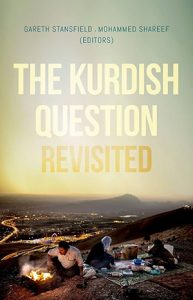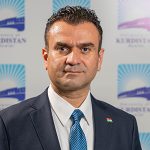The Kurdish Question Revisited

Editor(s): Gareth Stansfield & Mohammed Shareef
Publisher: Hurst Publishers
Year of Publication: 2017
Print Length: 712 pages
Genre: Non-Fiction / History, Political Science
Area: Kurdistan, Turkey/Türkiye, Iran, Iraq, Syria, Middle East, Central Asia
People: Kurds
Topic: Borders, Challenges & Opportunities, Future Scenarios; Self-Determination, Autonomy, Agency; Culture & Society, Cultural Heritage/Legacy, Exclusion, Conflict, Oppression, Genocide, Rebellion, Violence & Mass Violence, Local & Global, Democracy, Identity, Ethnic & Ethnicity, Religion, Military, Geopolitics, History, Nation-Building & Nationhood, National Consciousness, Mobility & Immobility, Politics & Power, State Formation, Transnationalism; Memory, Remembering and Forgetting; Social Movement, System, Media & Narratives, Everyday Life, Music, Education, Water, Development, Peace, Friendship & Companionship
The Kurds, once marginal in the study of the Middle East and secondary in its international relations, have moved to centre stage in recent years.
In Turkey, where the Kurdish question is an issue of national significance, and in Iraq, where the gains made by the Kurdistan Regional Government have allowed it to impose its authority, moves are afoot to solve ‘the Kurdish Question’ once and for all. In Syria, where the Kurds have borne the brunt of the Islamic State’s onslaught as they defended their three self-declared cantons of Afrin, Kobane, and Cezire, and in Iran, where they struggle to express their cultural distinctiveness and suffer disproportionately at the hands of the Islamic Republic’s security and intelligence services, the picture is less positive. Yet, the situations in both countries remain in flux, affected by developments in Iraq and Turkey in a manner that suggests we may have to revise the notion of the Kurds being forever divided by the boundaries of the Middle East and subsumed into the state projects of other nations.
The contributors to The Kurdish Question Revisited offer insights into how this once seemingly intractable, immutable phenomenon is being transformed amid the new political realities of the Middle East.
Table of Contents
Maps
Introduction – Gareth Stansfield (University of Exeter) and Mohammed Shareef (University of Exeter)
PART 1: REFLECTIONS ON DEBATES OF IDENTITY AND NATION
1. New Perspectives on Writing the History of the Kurds in Iraq, Syria and Turkey: A History and State of the Art Assessment – Jordi Tejel (Graduate Institute of Geneva)
2. Social Movement Theory and Political Mobilization in Kurdistan – David Romano (Missouri State University)
3. Religion Among the Kurds: Between Naqshbandi Sufism and IS Salafism – Michiel Leezenberg (University of Amsterdam)
4. Politics of Memory: Kurdish Ethnic Identity and the Role of Collective Forgetting – Hakan Özoğlu (University of Central Florida)
5. “Being in Time”: The Kurdish Movement and Universal Quests – Hamit Bozarslan (EHESS Paris)
6. Separated but Connected: The Synergic Effects in the Kurdistan Sub-System – Ofra Bengio (Tel Aviv University)
7. Fact and Fiction in Modern Kurdish Narrative Discourse – Hashem Ahmadzadeh (University of Stockholm)
8. Political and Everyday Religion in Kurdistan – Diane E. King (University of Kentucky)
9. The Shifting Borders of Conflict, Difference, and Oppression: Kurdish Folklore Revisited – Christine Allison (University of Exeter)
10. Kurdish Music in Armenia: The Music of the Yezidis – Nahro Zagros (University of Soran)
PART 2: THE KURDISH QUESTION IN THE OTTOMAN EMPRE AND TURKEY
11. The Sheikh Ubeidullah Rebellion of 1880 – Sabri Ates (Southern Methodist University)
12. Journalism Beyond Borders: The Bedirkhans and the First Kurdish Gazette, 1898–1902 – Janet Klein (University of Akron)
13. Mobilisation of Kurds in Turkey during the 1980s and the 1990s – Cengiz Gunes (The Open University)
14. Turkey’s Kurdish Problems, The Kurds’ Turkish Problems – Bill Park (King’s College London)
15. The Transformation of Turkey’s Kurdish Question – Henri Barkey (The Wilson Center)
16. Contrasting Turkish Paradigms Toward the Volatile Kurdish Question: Domestic and Foreign Considerations – Michael M. Gunter (Tennessee Technological University)
17. The Kurdistan Workers’ Party (PKK): Radical Democracy and the Right to Self-Determination Beyond the Nation-State – Joost Jongerden (Wageningen University)
18. The PKK, the Kurdish Movement, and the Emergence of Kurdish Cultural Policies in Turkey – Clémence Scalbert-Yücel (University of Exeter)
PART 3: THE KURDISH QUESTION AND SYRIA
19. The Curious Question of the PYD-PKK Relationship – Zeynep Kaya (LSE) and Robert Lowe (LSE)
20. Kurdish Political Parties and the Syrian Uprising – Harriet Allsopp (independent scholar)
PART 4: THE KURDISH QUESTION AND IRAN
21. The Kurdish Conundrum and the Islamic Republic of Iran, 1979-2003 – Nader Entessar (University of Southern Alabama)
22. Identities and Ethnic Hierarchy: The Kurdish Question Revisited in Iran – Olivier Grojean (Aix-en-Provence)
23. Fellow Aryans and Muslim Brothers: Iranian Narratives on the Kurds – Walter Posch (Austrian National Defence Academy, Vienna)
PART 5: THE KURDISH QUESTION AND IRAQ
24. The Kurdish Experience in Post-Saddam Iraq – Gareth Stansfield (University of Exeter)
25. Arabization as Genocide: The Case of the Disputed Territories of Iraq – Mohammed Ihsan (University of Erbil)
26. The Development of the Kurdistan Region of Iraq’s Higher Education Sector: A Gender Perspective – Katherine Ranharter (University of Exeter)
27. Water and Development in the Iraqi Kurdistan – Greg Shapland (University of Exeter)
28. Peace Education in the Kurdistan Region of Iraq: Evolution and Limitations – Kelsey Shanks (University of Exeter)
29. The Iraqi Kurdish Response to the “Islamic State”: Political Leverage in Times of Crisis – Benjamin Isakhan (Deakin University)
30. In Pursuit of Friends: The Kurdistan Region of Iraq’s Foreign Affairs and Diplomacy – Renad Mansour (Carnegie – Beirut)
31. A Paradigm Shift in US-Kurdistan Region of Iraq Relations Post-2014: The Evolution to a Strategic Partnership – Mohammed Shareef (University of Exeter)
32. Re-claiming Halabja – Nicole Watts (San Francisco State University)
33. Media, Political Culture, and the Shadows of the Militia War in Iraqi Kurdistan – Andrea Fischer-Tahir (Zentrum Moderner Orient Berlin)
34. Experiences of Honor-based Violence, and Moving Toward Action in Iraqi Kurdistan – Nazand Begikhani (University of Bristol) and Gill Hague (University of Bristol)
35. The Kurdistan Region of Iraq and the Federal Constitution: A Perimeter Plinth of State Territorial Integrity or a Stepping Stone to Secession? – Francis Owtram (University of Exeter)
Annex to Chapter 27
Notes
Bibliography
About the Contributors

Gareth Stansfield is a Political Scientist at the Institute of Arab and Islamic Studies, University of Exeter. He is currently the Pro-Vice-Chancellor of the College of Social Sciences and International Studies. His research has focused on the modern politics of the Middle East, with particular reference to Iraq and Kurdistan, and thematic areas including conflict and conflict management, post-conflict rehabilitation, and state-building. He has recently completed a 5 year project funded by the ESRC addressing approaches to managing contestation over intra-state territories, which included extensive research in Iraq, Kurdistan, and areas previously controlled by the Islamic State organisation.
Source: https://www.exeter.ac.uk/research/socialinequality/researchers/garethstansfield/
More from Gareth Stansfield in this library, click here.

Mohammed Shareef is a Lecturer in International Relations and Diplomacy at the University of Kurdistan Hewlêr (UKH). He became a UKH faculty member in January 2022 joining the Politics and International Relations programme. Mohammed is a fellow of the Royal Asiatic Society (London) as well as many other professional bodies. He was previously a Lecturer in Politics and International Relations of the Middle East at the University of Exeter in the United Kingdom and the Universities of Sulaimani and Soran in the Kurdistan Region of Iraq. Shareef’s professional background is diverse, his previous employment also includes the United Nations, BBC and several INGOS. Shareef completed his PhD in International Relations at the University of Durham and has an MSc in International Relations from the University of Bristol in the United Kingdom. His research interests include US foreign policy in the Middle East, US policy towards Iraq and its Kurdistan Region, as well as the politics and international relations of greater Kurdistan. Shareef is the author and editor of many books, book chapters and articles. Mohammed has given numerous talks at top Think Tanks and world-class academic and governmental institutions, including the universities of Oxford, Cambridge, SOAS, the UK’s Parliament and Foreign Office, Chatham House and the Washington Middle East Institute, amongst others. Mohammed Shareef is also a strategist, media commentator and analyst.
Source: https://www.ukh.edu.krd/faculty/mohammed-jalal-majeed-shareef/
More from Mohammed Shareef in this library, click here.
